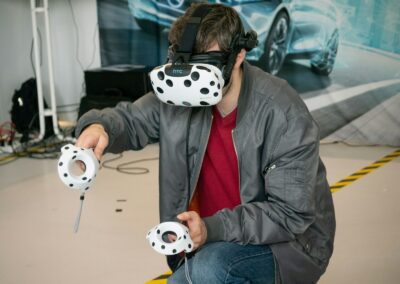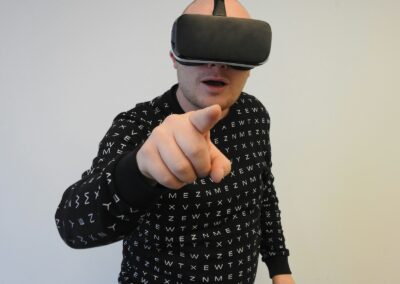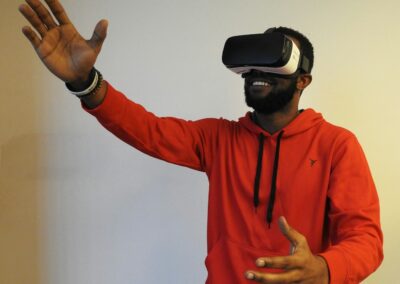Addressing the Philosophical Implications of the Metaverse and Virtual Technologies
The Metaverse: Bridging Reality and Simulation in Saudi Arabia and the UAE
In regions like Saudi Arabia and the UAE, where technological adoption is at the forefront, the blending of reality and simulation is particularly pronounced. While these innovations offer unprecedented opportunities for business, entertainment, and education, they also pose significant philosophical and ethical questions that must be addressed.
The metaverse, a collective virtual shared space, is redefining how individuals engage with digital environments. In Riyadh, businesses are leveraging the metaverse to create immersive customer experiences, enhance employee training, and develop new forms of digital collaboration. Similarly, in Dubai, the metaverse is being utilized to drive tourism, with virtual tours of the city’s landmarks and cultural sites attracting global visitors. However, as these virtual experiences become more realistic, the distinction between reality and simulation blurs, raising concerns about the impact on human perception and behavior.
One potential consequence of this blurring is the alteration of social interactions. Virtual environments can offer richer, more diverse experiences than the physical world, potentially leading individuals to prefer virtual interactions over real-life connections. This shift could affect social cohesion and the nature of human relationships. To address these concerns, it is crucial to establish ethical guidelines that promote balanced use of virtual technologies, ensuring that they complement rather than replace real-world interactions. In Saudi Arabia and the UAE, fostering a culture of digital well-being can help mitigate the risk of social isolation and maintain the integrity of human connections.
Moreover, the metaverse and virtual reality technologies pose significant challenges to the concept of authenticity. As simulations become indistinguishable from reality, the value placed on genuine experiences may diminish. For instance, virtual reality can replicate real-world activities such as traveling, attending events, or exploring new environments, potentially reducing the desire for actual experiences. This raises philosophical questions about the nature of reality and the human experience. Engaging in philosophical inquiry can help explore these questions, providing a deeper understanding of the implications of blurring the lines between reality and simulation.
Philosophical Inquiry and Ethical Considerations
The philosophical implications of blurring reality and simulation extend beyond social interactions and authenticity to encompass broader ethical considerations. In Saudi Arabia and the UAE, where technological innovation is rapidly advancing, it is essential to address these implications through thoughtful and rigorous philosophical inquiry. This involves examining the ethical frameworks that guide the development and use of virtual technologies, ensuring they align with societal values and promote the well-being of individuals and communities.
One critical ethical consideration is the potential for manipulation and exploitation within virtual environments. The immersive nature of the metaverse and virtual reality can be used to influence users’ perceptions, emotions, and behaviors in subtle and powerful ways. For example, targeted advertising and persuasive design techniques can exploit users’ psychological vulnerabilities, leading to unethical commercial practices. In Riyadh, regulatory bodies are developing policies to protect users from such exploitation, emphasizing transparency, consent, and accountability. These policies must be informed by philosophical inquiry to ensure they address the deeper ethical issues at play.
Another significant concern is the impact of virtual technologies on mental health. Prolonged exposure to virtual environments can lead to issues such as digital addiction, desensitization to real-world experiences, and cognitive dissonance. In Dubai, initiatives are being implemented to promote digital well-being and provide resources for individuals struggling with the mental health impacts of virtual technologies. Ethical guidelines must prioritize mental health, encouraging responsible use of virtual technologies and providing support for those affected by their negative consequences.
Furthermore, the environmental impact of maintaining and expanding virtual technologies must be considered. The infrastructure required for the metaverse, including data centers and digital devices, contributes to significant energy consumption and carbon emissions. In Saudi Arabia and the UAE, efforts are being made to develop sustainable technological practices, such as using renewable energy sources for data centers and promoting energy-efficient designs. Philosophical inquiry can provide a framework for understanding the ethical implications of these environmental impacts, guiding the development of sustainable and responsible virtual technologies.
The Role of Leadership in Navigating the Virtual Future
Leadership plays a crucial role in addressing the philosophical and ethical implications of blurring reality and simulation. Business executives, mid-level managers, and entrepreneurs in Saudi Arabia and the UAE must lead by example, fostering a culture of ethical responsibility and philosophical reflection within their organizations. This involves setting clear ethical standards, providing training on ethical issues, and ensuring accountability at all levels of the development and deployment of virtual technologies.
One key strategy for promoting ethical leadership is to integrate ethical considerations into the decision-making process. Leaders must evaluate the potential ethical impacts of virtual technology projects and ensure that these considerations are factored into strategic planning and implementation. In Riyadh, organizations are adopting ethical review boards and committees to oversee virtual technology initiatives, ensuring compliance with ethical standards and promoting transparency. These bodies provide valuable oversight and guidance, helping to navigate the complex ethical landscape of virtual technologies.
Additionally, fostering open dialogue and collaboration with external stakeholders is essential. In Dubai, virtual technology initiatives involve partnerships with academic institutions, regulatory bodies, and civil society organizations to ensure a diverse range of perspectives inform ethical guidelines. Engaging with the public and promoting transparency in virtual technology projects can build trust and enhance the credibility of virtual technology efforts. This collaborative approach ensures that ethical guidelines are robust, inclusive, and reflective of societal values.
Finally, continuous education and capacity-building are critical for maintaining high ethical standards in the development and deployment of virtual technologies. Business leaders must invest in ongoing training and development programs that equip their teams with the knowledge and skills needed to implement ethical practices. In the UAE, organizations are offering workshops, seminars, and certification programs focused on virtual technology ethics, digital well-being, and philosophical inquiry. By fostering a culture of continuous learning and improvement, leaders can ensure that their organizations remain at the forefront of ethical virtual technology development.
Conclusion: Navigating the Philosophical Landscape of Virtual Technologies
The potential consequences of blurring the lines between reality and simulation are complex and multifaceted. In Saudi Arabia and the UAE, the responsible and ethical development and deployment of virtual technologies require a comprehensive approach that balances innovation with philosophical inquiry and ethical responsibility. By addressing concerns related to social interactions, authenticity, mental health, and environmental impact, business executives, mid-level managers, and entrepreneurs can navigate the ethical challenges of virtual technologies effectively.
As virtual technologies continue to evolve, the importance of ethical guidelines and philosophical reflection will only increase. By implementing rigorous assessments, leveraging advanced technologies, promoting public engagement, and fostering a culture of ethical leadership, leaders in Riyadh, Dubai, and beyond can ensure that virtual technologies serve as a force for positive societal change. Ultimately, a commitment to ethical integrity and philosophical inquiry will guide the successful integration of virtual technologies into society, benefiting both individuals and communities.
—
#RealityVsSimulation #MetaverseImpact #PhilosophicalInquiryInTechnology #AIinSaudiArabia #UAEVirtualReality #RiyadhDigitalTransformation #DubaiMetaverse #AIEthics #LeadershipInTechnology #ModernTechnologyConsequences
























